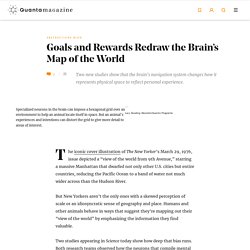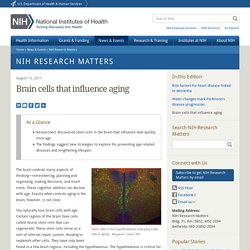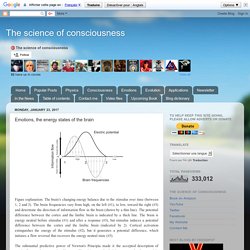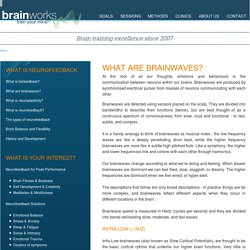

Stress Messes with Your Gray Matter. “Now what was I doing?”

As anyone who has found themselves staring at the shelves in their supermarket or at their computer screen after having been lost in thought about some worrisome situation in their life knows, stress affects your brain. A key role of the prefrontal cortex in the maintenance of chronic tinnitus: An fMRI study using a Stroop task. A thalamic reticular networking model of consciousness. Quanta Magazine. The iconic cover illustration of The New Yorker’s March 29, 1976, issue depicted a “view of the world from 9th Avenue,” starring a massive Manhattan that dwarfed not only other U.S. cities but entire countries, reducing the Pacific Ocean to a band of water not much wider across than the Hudson River.

But New Yorkers aren’t the only ones with a skewed perception of scale or an idiosyncratic sense of geography and place. Humans and other animals behave in ways that suggest they’re mapping out their “view of the world” by emphasizing the information they find valuable. Two studies appearing in Science today show how deep that bias runs. Both research teams observed how the neurons that compile mental maps of physical space reprogram themselves to better reflect our experiences, activities and priorities.
Visualization of the antioxidative effects of melatonin at the mitochondrial level during oxidative stress-induced apoptosis of rat brain astrocytes. - PubMed - NCBI. Pineal Gland Is Literally A 3rd Eye-proof. Is it possible that you literally have a third eye that connects you to spiritual dimensions?

What Does Mindfulness Meditation Do to Your Brain? As you read this, wiggle your toes.

Feel the way they push against your shoes, and the weight of your feet on the floor. Really think about what your feet feel like right now – their heaviness. If you’ve never heard of mindfulness meditation, congratulations, you’ve just done a few moments of it. More people than ever are doing some form of this stress-busting meditation, and researchers are discovering it has some quite extraordinary effects on the brains of those who do it regularly. Originally an ancient Buddhist meditation technique, in recent years mindfulness has evolved into a range of secular therapies and courses, most of them focused on being aware of the present moment and simply noticing feelings and thoughts as they come and go.
Credit: Sebastien Wiertz via Flickr It’s been accepted as a useful therapy for anxiety and depression for around a decade, and mindfulness websites like GetSomeHeadSpace.com are attracting millions of subscribers. No fear. Brain cells that influence aging. At a Glance Researchers discovered stem cells in the brain that influence how quickly mice age.The findings suggest new strategies to explore for preventing age-related diseases and lengthening lifespan.

The brain controls many aspects of thinking—remembering, planning and organizing, making decisions, and much more. These cognitive abilities can decline with age. Exactly what controls aging in the brain, however, is not clear. You naturally lose brain cells with age. To investigate whether stem cells in the hypothalamus influence the aging process, a team of scientists led by Dr. The researchers first observed what happens to stem cells in the hypothalamus as healthy mice age. Why does our left hemisphere of brain control our right side of our body and the right our left? Negative thinking vs brain activity. The science of consciousness: Emotions, the energy states of the brain.
Sensory perception is automatic, involuntary process.

We cannot ‘decide’ not to process sensory stimulus or read the road signs, because stimulus impinges on the mind by shifting the brain’s energy balance. Moreover, sensory perception is an energy requiring, and active process, in which the brain ‘pays’ for sensory stimuli through the energy requirement of high brain frequencies. Thus, sensory processing is an energy-information exchange with the environment. The limbic system channels incoming stimuli (information), as fast oscillations, to the sensory cortex, where electric currents accentuate or subdue each other through field effects. The brain’s highly fluid neural organization allows active balancing of electromagnetic gradients based on charge conservation. Theta Healing Theta-State. THETA STATE AND THETA BRAINWAVES Theta is the state of mind where it is believed you can create everything and change reality instantly.

WHAT IS THE THETA STATE? There are five main frequency brain waves: Beta, Alpha, Theta, Delta, and Gamma. These brain waves are in constant motion, the brain produces consistent waves at all frequencies. Everything you do or say is regulated by the frequency of brain waves. When we talk to others, for example, our mind is in Beta. The Beta wave has a frequency of 14-28 cycles per second. In a Alpha state, your brain waves move at a frequency between 7-14 cycles per second. What are Brainwaves ? Types of Brain waves. At the root of all our thoughts, emotions and behaviours is the communication between neurons within our brains.

Brainwaves are produced by synchronised electrical pulses from masses of neurons communicating with each other. Brainwaves are detected using sensors placed on the scalp. They are divided into bandwidths to describe their functions (below), but are best thought of as a continuous spectrum of consciousness; from slow, loud and functional - to fast, subtle, and complex. It is a handy analogy to think of brainwaves as musical notes - the low frequency waves are like a deeply penetrating drum beat, while the higher frequency brainwaves are more like a subtle high pitched flute. Like a symphony, the higher and lower frequencies link and cohere with each other through harmonics. Our brainwaves change according to what we’re doing and feeling.
Brainwave speed is measured in Hertz (cycles per second) and they are divided into bands delineating slow, moderate, and fast waves. Brain waves may focus attention and keep information flowing. We can’t see it, but brains hum with electrical activity.

Brain Decides, Then Tells You Later.